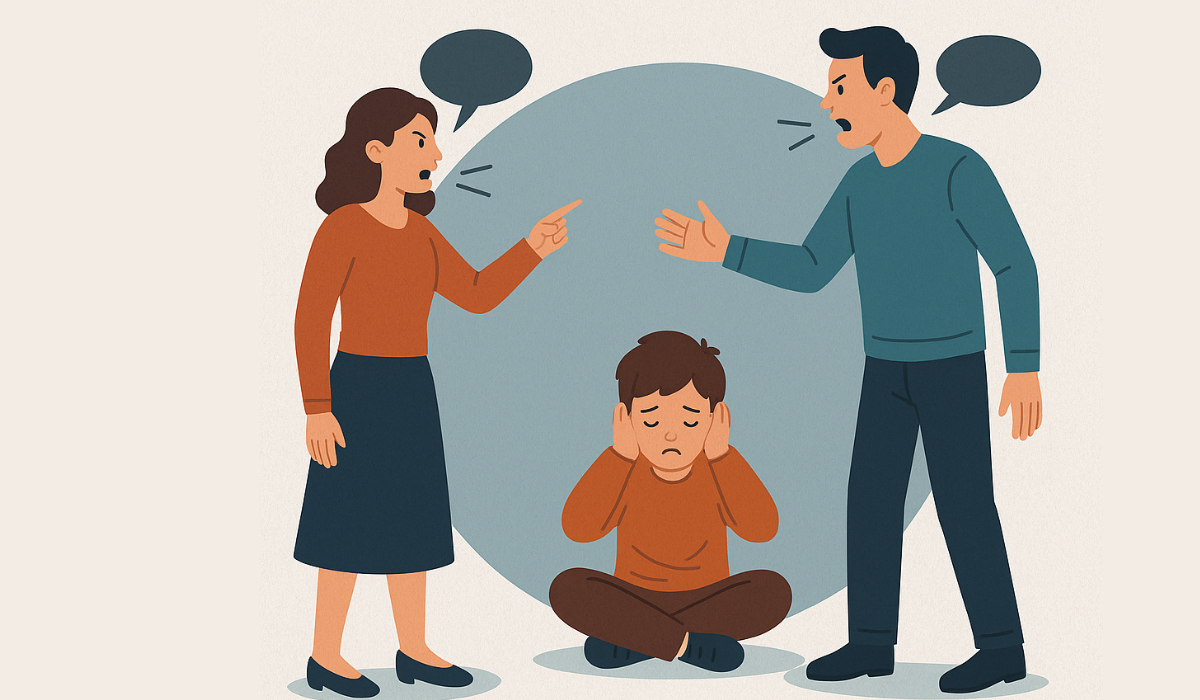Let’s talk about a common but overlooked situation: your ex’s new partner speaks poorly about you in front of your child. This dynamic is toxic and confusing for kids. It sends the message that disrespect is normal. It can feel like a betrayal from both the parent and their new partner. It creates emotional triangulation, and kids feel stuck in the middle. This behavior often reflects the insecurities and low self-esteem of the person speaking. Confident individuals don’t need to tear others down. Speaking negatively about someone, especially someone no longer in your life, says more about you than them.
What It Says About You
Speaking poorly of your ex isn’t a reflection of your ex. It’s a reflection of your own unhealed wounds.
It can mean:
- You haven’t fully processed your emotions
- You’re still holding onto resentment or pain
- You haven’t learned how to separate your identity from that relationship
This doesn’t mean you’re a bad person, it means you’re human. You deserve healing to help overcome this negativity and allow positive, healthy thoughts to replace the negative.
My Personal Experience
In being completely transparent, this isn’t just something I teach as a therapist, it’s something I’ve had to live through, learn from, and intentionally change.
There was a time I spoke negatively about my ex. I was hurt and angry. Over time, through my own therapy and healing journey, I realized that this behavior didn’t serve me or my kids. I began to notice that the more I spoke from resentment, the heavier I felt, and the more my kids seemed to carry emotions that weren’t theirs to hold. It wasn’t empowering, and it wasn’t at all aligned with who I want to be.
Now, I’m intentional about my language. I focus on modeling respect, even when it’s hard.
I still continue to look at my patterns, my pain, and my part in the emotional cycle. Through this process, I understand:
- That my words hold more power than I realize.
- Speaking negatively about my ex does not release my anger; it only amplifies it.
- That my kids need a safe emotional space, not a battleground of blame.
I do my very best to make a conscious choice to change the way I speak about my ex. Not because everything was suddenly perfect, but because I no longer wanted to give my energy to anything that kept me stuck.
The Negative Energy You Carry
Every time you speak negatively about someone, especially someone you once loved, you drain your own energy. That negativity lingers. It blocks growth, joy, and connection.
Gossip and criticism may feel temporarily satisfying, but they erode your character and your spirit over time.
Want to grow? Start by letting go of the need to judge.
Shifting the Narrative
Here’s what you can say instead:
- “Your dad and I see things differently, and that’s okay.”
- “We had our challenges, but we both love you very much.”
- “I don’t agree with his choices, but I respect your relationship with him.”
This kind of language models maturity, self-regulation, and emotional intelligence.
Reflective Journaling Prompts
- What unresolved emotions do I still carry about my ex?
- How do I want my children to view relationships and conflict?
- What kind of energy do I want to bring into my home?
- What would releasing resentment feel like in my body and mind?
- What am I modeling for my children with my words and tone?
Co-parenting after a separation or divorce is rarely easy. Emotions can run high, and wounds, especially unhealed ones, can rear their heads in the form of bitterness, blame, or even subtle jabs. When children are involved, there’s one rule that should never be broken:
Be mindful of how you speak about your ex in front of your kids.
This is also important and applies to new partners as well. Whether it’s a new girlfriend, boyfriend, stepparent, or even a well-meaning grandparent, no one should be speaking poorly about a child’s parent in their presence.
Yet, it happens all the time.
Maybe the girlfriend of your child’s father says something cutting at the dinner table about how “your mom always plays the victim.” Maybe your ex-husband regularly tells your son, “Your mom is crazy. That’s why we’re not together.”
At first glance, these comments might seem like emotional slips or spur-of-the-moment frustrations. They can leave lasting psychological damage, and often reveal much more about the speaker than the person being criticized.
As a therapist and life coach with over 25 years of experience and as a mother who has navigated her own journey through divorce, I have seen the long-term effects of this behavior firsthand.
Let’s break down what this kind of communication really means, why it’s so harmful to your children, and how to set boundaries that protect your child’s emotional well-being.
Children Are Not Emotional Dumpsters
Children are hard-wired to love both of their parents. It’s primal. It’s instinctual. When you speak negatively about your ex in front of your child, you’re not just insulting the other parent, you’re indirectly attacking a part of your child’s identity.
Here’s the thing many parents don’t realize:
When you say, “Your dad is a liar,” a child doesn’t just hear a criticism of their father.
They hear, “A part of me is bad, too.”
You’re putting your child in an emotional tug-of-war: “If I love my mom, am I betraying my dad? If I feel close to my dad, does that mean I agree with what he says about my mom?”
This creates what therapists call loyalty binds, and they can be incredibly damaging to a child’s developing sense of self. These binds often show up later as anxiety, depression, low self-esteem, emotional repression, and difficulty forming healthy relationships.
In short: when you badmouth your ex in front of your child, you force them to carry an emotional burden that isn’t theirs.
What Happens When the New Partner Joins the Blame Game
Let’s say your ex has a new partner. This person may have little context about your shared history, yet they begin to speak negatively about you in front of your children.
“This is why your mom is always single, she pushes everyone away.”
“Your mom’s so selfish; your dad deserves better.”
“Good thing you have me in your life now, because your mom doesn’t care.”
Sound familiar?
This is emotional sabotage disguised as adult conversation. This is often rooted in deep insecurity.
When a new partner speaks poorly about an ex-spouse, especially in front of a child, it typically reflects their own unresolved issues, fear of comparison, jealousy, low self-worth, or a need to assert dominance.
It’s also incredibly manipulative. These comments are often intended to erode the child’s bond with their parent and to establish a new loyalty with the speaker. But it rarely works that way.
Instead, children learn to distrust the adults around them.
They may shut down emotionally, act out in school, or internalize shame and confusion. These reactions don’t just disappear with time, they become part of a child’s emotional wiring.
It’s Not About the Ex-It’s About Your Healing
Let’s be honest: divorce hurts. Separation is messy. There may be betrayal, resentment, and years of unspoken pain.
Using your child as a sounding board, or allowing your partner to use them as a pawn in the blame game, is a sign that you have healing work to do.
People who are secure in themselves don’t feel the need to assassinate someone else’s character to validate their own. If you (or your partner) can’t talk about your ex without bitterness or belittlement, it’s time to reflect:
- What emotions am I still holding onto?
- Why do I feel the need to speak negatively?
- Am I trying to control the narrative or someone else’s perception?
Children aren’t courtrooms. They are not meant to carry the weight of adult disputes.
Your job as a parent isn’t to convince them who was “right” or “wrong.” It’s to help them feel safe, loved, and emotionally stable.
How to Set Boundaries and Speak with Strength
So what can you do if you’re in a situation where an ex or their new partner is speaking negatively in front of your child?
Here are some steps that can help:
1. Model Emotional Maturity
Your child watches everything you do. You don’t have to be perfect, but you do have to be intentional.
Instead of badmouthing your ex, say:
- “Your dad and I don’t always agree, but we both love you very much.”
- “That’s something between adults, and I won’t put you in the middle.”
- “Even when things are hard, I want you to feel free to love both of your parents.”
These responses show emotional maturity, which gives your child permission to do the same.
2. Address It Directly,with Boundaries, Not Blame
If your ex’s partner is speaking negatively about you in front of your child, you have every right to speak up:
“I’d like to respectfully ask that your girlfriend not speak about me in front of our child. It’s damaging and confusing for her. If there’s an issue, I’m happy to address it directly.”
Keep your tone calm, factual, and assertive, not emotional or accusatory.
Remember: You’re setting a boundary, not starting a battle.
3. Teach Your Child Emotional Literacy
When your child hears something inappropriate, help them name what they’re feeling.
“It sounds like it made you uncomfortable when you heard that. It’s okay to feel upset or confused. You can always talk to me about it.”
You are their safe place. Helping them process these moments is a powerful way to build trust and resilience.
4. Get Support for Yourself
You don’t have to carry this alone.
- Work with a therapist or coach to process unresolved anger.
- Join support groups for single parents or co-parents.
- Learn tools to emotionally detach from toxic dynamics.
You don’t have to carry this alone.
Learn tools to emotionally detach from toxic dynamics.
- Work with a therapist or coach to process unresolved anger.
- Join support groups for single parents or co-parents.
- Learn tools to emotionally detach from toxic dynamics.
Final Thoughts: Heal Forward, Don’t Project Backward
Divorce doesn’t end your role as a parent, it expands it. Now, you’re not just parenting your child. You’re parenting yourself, too.
You’re parenting the parts of you that still feel hurt. The parts that want to be right, and the parts that feel abandoned, misunderstood, or mistreated.
Healing is your responsibility, not your child’s. When you step into that healing, you model what emotional strength really looks like.
So the next time you’re tempted to vent about your ex, ask yourself:
“Is what I’m about to say going to help my child feel safe, loved, and emotionally secure?”
Be intentional with your words,pause, breathe, and choose better words or do not say anything at all if it is negative..
If someone else (like a partner) crosses that line, advocate fiercely for your child. It is important to be aware that protecting your child’s emotional safety is a non-negotiable.
Remember: Your Child is Half of You and Half of Them
You can’t rewrite history. What you can do is write a new story, one where your child learns that love, respect, and maturity always win. Our children deserve to grow up in an emotional environment that doesn’t require them to shrink, split, or choose sides.
Your words matter and are energy. Speak from the place you want to live from. I love using the quote “the words you use become the house you live in” with my clients.
Want more support navigating co-parenting, setting healthy boundaries, and raising emotionally resilient kids?
Let’s work together. I offer therapy and coaching for individuals and families navigating life after divorce.






